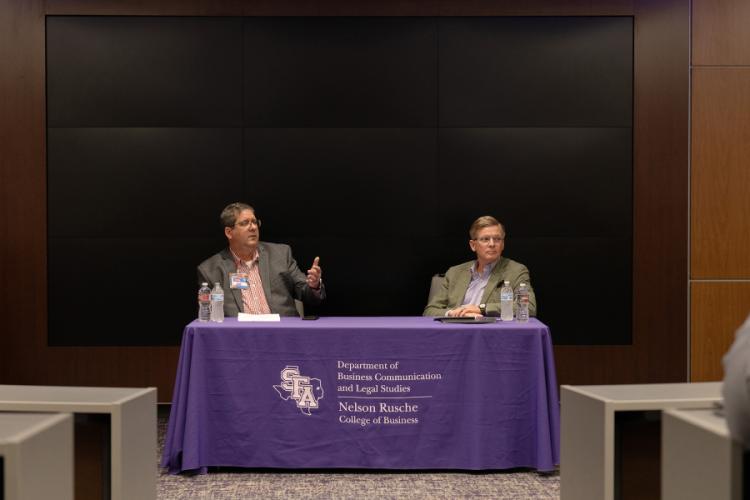NACOGDOCHES, Texas — Stephen F. Austin State University students learned about the humane treatment of animals in the food chain during an early March panel discussion hosted by the Rusche College of Business Department of Business Communication and Legal Studies.
Panelists Jim Lanier, fresh quality assurance director for HEB, and David Alders, former SFA regent and president of Carrizo Creek Corporation in Nacogdoches, first asked students how many of them grew up on farms and ranches. A few hands went up, but as Alders asked whose grandparents grew up in a farming environment, nearly all the students raised their hands.
“We’re two or more generations removed from the time when cattle and poultry were raised mostly on family farms,” Alders said. “Your generation is very concerned about the ethics of animal agriculture and whether the food was produced locally.”
HEB, a Texas-based independently owned food retailer, serves 6.4 million out of the state’s 10.8 million families, Lanier said.
“Because we’re private, we can control where the money goes, and we are able to keep our costs low and provide customers with a range of choices, like 16 lines of beef to meet different economic needs and consumer preferences,” he said. “People want to feel good about the food they eat. People trust HEB. We’ve built that trust over time.”
Alders, who raises 130,000 chickens on his cattle and poultry farm, is one of HEB’s food producers.
“I do my best to enhance my animals’ welfare every day and minimize their stress,” Alders said. “If I don’t, they’re not going to prosper and gain weight efficiently.”
He ensures his conditions are optimal for his chickens by housing them in structures where they’re protected from predators, and they have good ventilation and plenty of food and water.
“I believe I personally have a moral obligation — not just a profit motivation — to protect my herd of cattle and flock of poultry and know what they’re doing, so I’m constantly checking on them,” Alders said.
His animal care, which includes not using antibiotics, aligns with HEB’s quality assurance policies.
“We’re relatively unique at HEB in that we don’t write the animal welfare policies we enforce on our own,” Lanier said. “We work with industry, academia and production experts to do that.”
Both Alders and Lanier said educating consumers on terms used to market the poultry sold in grocery stores is challenging. “Grass fed,” “cage free” and “hormone free” are some of those terms.
“No poultry producers have ever used hormones,” Alders said. “It’s against the law. Calling meat or poultry ‘hormone free’ is like calling water ‘gluten free.’ Water has never had gluten.”
Alders believes climate-controlled chicken houses that contain individual nipples for water access and allow waste to drop below the cages so chickens don’t walk through and lay their eggs in it is chicken paradise in an egg farm context.
“I find my broiler (meat) chickens also are far less stressed in a climate-controlled environment,” he said.
At the end of the discussion, Lanier and Alders advised students to complete internships to prepare for their future careers.
“We value experience almost as much as we value education,” Lanier said. “By interning, you become a known commodity to the people hiring, and you get a chance to evaluate whether a company has the same principles as you do.”
Alders added that networking with the right people is key.
“Choosing your friends and the peers you look up to wisely is important,” he said. “You’ll have those relationships for years to come.”
Dr. Kristen Waddell, assistant professor of business communication and legal studies, said panel discussions like this help students see how concepts from SFA’s business ethics courses apply to real businesses.
“Our goal is for these concepts to stay with students beyond the classroom as they start their own careers,” Waddell said.
Visit SFA’s Department of Business Communication and Legal Studies website for more information.
ABOUT STEPHEN F. AUSTIN STATE UNIVERSITY
Stephen F. Austin State University, the newest member of The University of Texas System, began a century ago as a teachers’ college in Texas’ oldest town, Nacogdoches. Today, it has grown into a regional institution comprising six colleges — business, education, fine arts, forestry and agriculture, liberal and applied arts, and sciences and mathematics. Accredited by the Southern Association of Colleges and Schools, SFA enrolls approximately 11,000 students while providing the academic breadth of a state university with the personalized attention of a private school. The main campus encompasses 421 acres that include 37 academic facilities, nine residence halls, and 68 acres of recreational trails that wind through its six gardens. The university offers more than 80 bachelor’s degrees, more than 40 master’s degrees and four doctoral degrees covering more than 120 areas of study. Learn more at the SFA website.
 Axe ’Em, Jacks!
Axe ’Em, Jacks!
